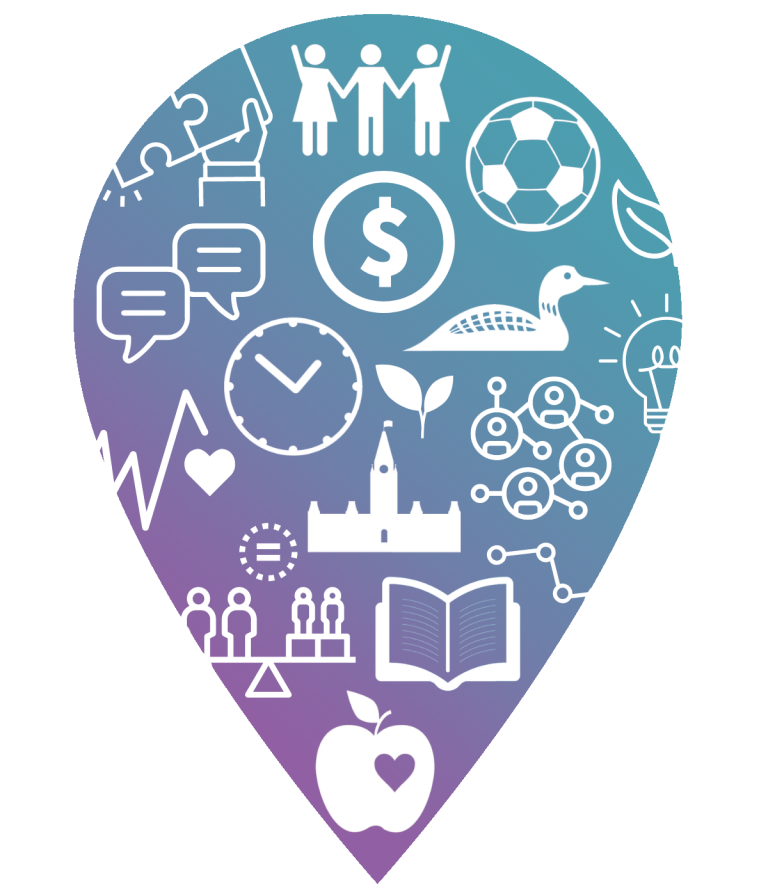Thank you to everyone who participated in the 2022 Community Wellbeing Mini-Survey. By sharing your voice, you contributed to making Waterloo Region a place where everyone thrives and no one is left behind.
Stay tuned for the final data report coming very soon!
Follow along our newsletter and social media accounts for more updates on how to stay connected with this data moving forward.

How will it be used?
Read about how the survey data will be used collaboratively by local organizations and area municipalities.
Read the 2019 Survey
Over 5,000 residents across Waterloo region completed the survey in 2019.
Learn about the CIW
The Canadian Index of Wellbeing aims to promote wellbeing and improve the quality of life of all Canadians.
Frequently Asked Questions
The 2022 Waterloo Community Wellbeing Mini-Survey is based on the eight domains of life that the Canadian Index of Wellbeing has identified as critical to our overall wellbeing: Community Vitality, Healthy Populations, Democratic Engagement, The Environment, Leisure and Culture, Education, Living Standards and Time Use.
Many community collaborators in Waterloo Region will be using this data to inform strategic planning processes and to make data-informed decisions about where energy and resources are needed most at this moment in time. Community organizations and agencies will use the information to better understand and support the people they are reaching.
Yes. All the information you provide in the survey will be kept strictly confidential. When you complete the survey online, your answers are recorded on a secure computer at the University of Waterloo where only the researchers at the Canadian Index of Wellbeing will have access to the data. At no time will your name or address be recorded or attached to your survey responses.
The Canadian Index of Wellbeing based in the Faculty of Health at the University of Waterloo will be collecting and summarizing the results, and Wellbeing WR will use the results to describe different groups in the Region – by municipality, for example – to produce a final report as well as additional data snapshots.
Demographic questions are intended to help shed light on wellbeing disparities across populations, and help organizations build programs and services that meet the needs of residents. This information will also help us ensure that we are hearing from many different groups with diverse experiences, and the survey data is representative of Waterloo Region residents. While you are not required to answer these questions, your answers are important in understanding where there are still gaps in wellbeing in order to create needed changes to eliminate barriers and inequities.
We have tested the survey and found it takes about 20 to 25 minutes to complete. You can choose not to answer any of the questions on the survey
No, you do not have to take this survey. Your participation in the survey is entirely voluntary, and be assured that all your answers will be kept strictly confidential.
The Canadian Index of Wellbeing recommends to administer a full wellbeing survey every 5-7 years, and a smaller version every 2-3 years. We worked collaboratively with a community advisory group to select the questions that feel the most important at this point-in-time.
This study has been reviewed and received ethics clearance through a University of Waterloo Research Ethics Board (REB #44744). If you have questions for the Board, please contact the Office of Research Ethics, at 1-519-888-4567, ext. 36005, or at reb@uwaterloo.ca.
SURVEY COLLABORATORS
Thank you to our funders, brainstormers and community connectors!
This list includes members of the Advisory Group, Steering Group, Focused Outreach Support & Funders*
African Women’s Alliance of Waterloo Region
Cambridge Food Bank
Cambridge-North Dumfries OHT
Children and Youth Planning Table
City of Cambridge*
City of Kitchener*
City of Waterloo*
Community Care Concepts of Woolwich, Wellesley & Wilmot
Coalition of Muslim Women KW
Community Justice Initiatives*
Immigration Partnership
Kind Minds Family Wellness
Kitchener Downtown Community Health Centre
Kitchener-Waterloo Multicultural-Centre
KW4 Ontario Health Team
Langs Community Health Centre*
Leadership Waterloo Region
Ontario Health (West)
Region of Waterloo*
Shamrock Co-operative Homes
Social Development Centre WR
Smart Waterloo Region Innovation Labs
SPECTRUM WR
Thresholds Homes and Supports
Township of North Dumfries*
Township of Wellesley *
Township of Woolwich*
Township of Wilmot
United Way Waterloo Region Communities*
Volunteer Waterloo Region
Waterloo Regional Police Services
Myalgic Encephalomyelitis Association
Wilfrid Laurier University
Woolwich Community Health Center*
Woolwich Community Services
Woolwich Counselling
Along with many community members with lived and living expertise who are participating in supporting focused outreach and part of the Steering and Advisory Groups.
Prizes
To thank participants for their time and effort on the survey, we had a draw to win a variety of prizes valued at $25 – $500! The winners were randomly selected by an automated generator and were sent their prizes in early 2023.
Thank you to these local businesses for donating a prize to the 2022 Community Wellbeing Mini-Survey!
- Stay-Cation in St. Jacobs
- 1-night stay at the Courtyard by Marriott
- 2 theatre tickets for St. Jacobs Country Playhouse
- A gift basket filled with local Woolwich goodies
- Dinner and Movie in Downtown Kitchener
- $20 gift card to Apollo Cinema
- $50 gift card to The Crazy Canuck
- 1hr Massage Gift Certificate at Verdure Wellness Clinic
- 4 tickets to a family event at Centre in the Square
- $50 gift card to Ethel’s Lounge (2 chances at winning!)
- $50 gift card to the Charcoal Group Restaurants
- Family Pass to THEMUSEUM
- Family Pass for the Ken Seiling Regional Museum (5 chances of winning!)
- 1 week at a City of Kitchener Summer Camp for 2023
